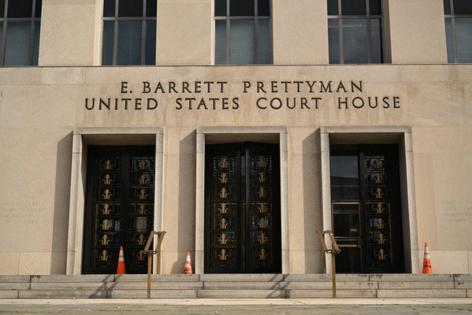What happens if Trump doesn't obey court orders? New spotlight on US marshals
Published in News & Features
WASHINGTON — As a couple of key court cases against President Donald Trump's executive actions intensify, questions of how and whether the White House will follow judges' orders are mounting.
Already, some judges have issued orders reprimanding the Trump administration and demanding action. But who has the authority to enforce such orders?
Situated at the nexus of the face-off between the executive and judicial branches is a little-scrutinized arm of the federal government: the U.S. Marshals Service.
Who are U.S. marshals?
The U.S. Marshals Service is a federal law enforcement agency. It is tasked with a broad range of actions — hunting fugitives, transporting federal prisoners and managing goods seized from criminals. Oftentimes the Marshals Service will work with state and local law enforcement agencies on particularly difficult cases, such as hunting down a man who escaped a Pennsylvania prison last year.
"People ask us to do jobs they're not willing to do," said Barry Lane, a spokesperson for the U.S. Marshals Service.
Federal courts also rely on the U.S. Marshals Service to enforce federal orders. Sometimes that means keeping order in a courtroom, said Stephen Monier, a retired former U.S. marshal for the district of New Hampshire.
"The judge can say, get him out of here for being disruptive in the courtroom — which, then, we would be responsible for," Monier said. "We would remove him from the courthouse."
The Marshals Service reports to the Department of Justice, which is part of the sprawling federal executive structure. But it serves as the enforcer of federal court orders — occupying an unusual position between the executive and judicial branches.
"Like the director of the FBI, the director of Marshals Service reports to the attorney general of the United States," Monier said, adding, "but because of our unique role with the court, we are the enforcement arm of the court."
Another responsibility of the Marshals Service is protecting courthouses and judicial officers. U.S. Marshals have ramped up security efforts in response to an increasing number of threats against judges and court personnel — including creating the Judicial Threat Branch to monitor and respond to high-level incidents. One of the marshals' responsibilities was providing protective service detail for U.S. District Judges Aileen Cannon and Tanya Chutkan, who ruled in criminal cases against Trump.
"These decisions generated threats directed at the judges that warranted protective service details," the U.S. Marshals Service's annual report notes.
Is Trump following court orders?
Trump has repeatedly said he will follow court orders, and White House officials have said they are following the letter of the law in the myriad cases brought against the administration since he took office. So far, the Supreme Court has issued limited rulings affecting the White House. Last weekend, the justices temporarily blocked the Trump administration from carrying out deportations of Venezuelan men deemed foreign gang members.
"We are obviously complying with the court's order," Karoline Leavitt, the White House press secretary, said Tuesday. "However, it was a temporary pause. The Supreme Court basically said, sit tight and they will follow up with an order, and we're confident that the Supreme Court will rule on the side of law and recognize the president absolutely has the executive authority to deport foreign terrorists from our nation's interior under the Alien Enemies Act."
But Trump has already lashed out at other federal court judges who've ruled against his administration over their efforts to deport immigrants — including U.S. District Judge James E. Boasberg, who threatened to hold White House officials in contempt of court for not following his earlier orders to stop a plane carrying deportees to an El Salvador prison midflight.
Boasberg said last week that he found probable cause for putting administration officials in criminal contempt for not turning the planes around.
What does being held in contempt of court mean?
Being held in criminal contempt of court means defying a judge's orders.
Boasberg said that Trump administration officials violated his orders by not stopping a plane carrying deportees to El Salvador. He warned that he could refer the matter for prosecution — where Department of Justice officials would have to decide whether to take up the case. If they decline to do so, Boasberg said, he would appoint a private attorney to prosecute the case against the administration and specific officials.
Holding a defendant — never mind a government official — in criminal contempt is rare.
"It would be very unusual in my experience," Monier said.
In another case, the Supreme Court said the administration had a duty to "facilitate" the return of Kilmar Abrego Garcia, a Salvadoran man the Trump administration said it had mistakenly deported to that country.
But Abrego Garcia remains in El Salvador, and U.S. District Judge Paula Xinis condemned the government's lawyers for defying the court's order, saying their "objection reflects a willful and bad faith refusal to comply."
Have U.S. marshals said they would enforce an order against the Trump administration?
No. The U.S. Marshals spokesperson declined to comment for this article and referred The Times to its annual report.
The U.S. Marshals Service is also without a permanent director, since Gadyaces Serralta, whom Trump appointed last month, has yet to be confirmed.
©2025 Los Angeles Times. Visit at latimes.com. Distributed by Tribune Content Agency, LLC.







Comments